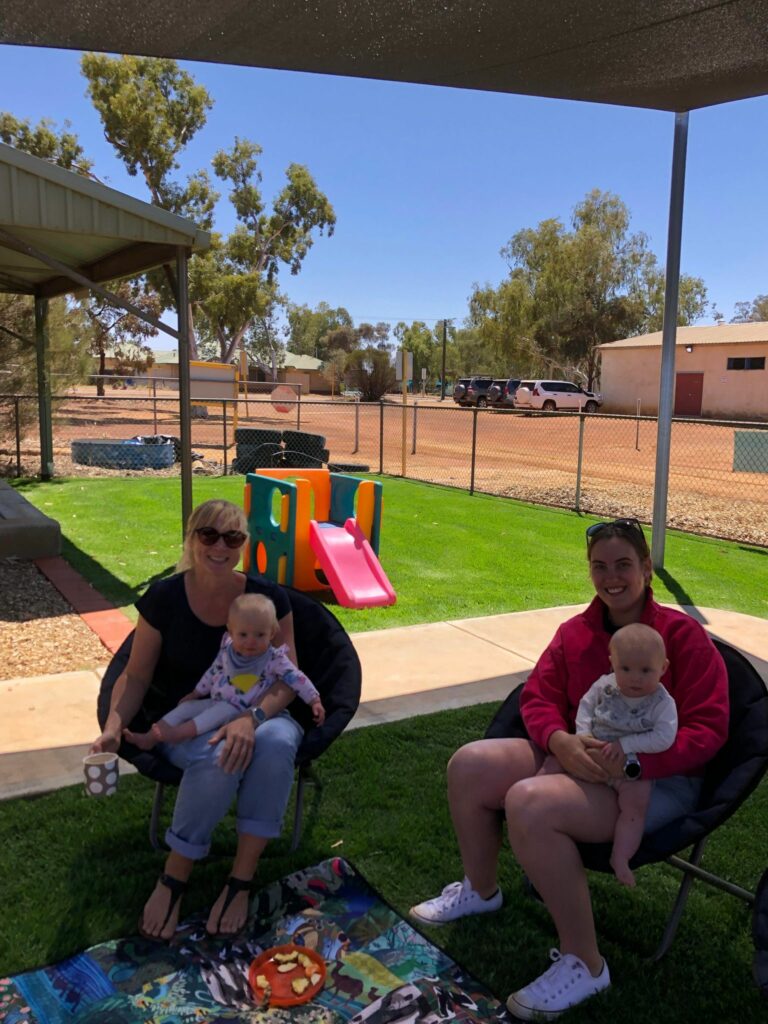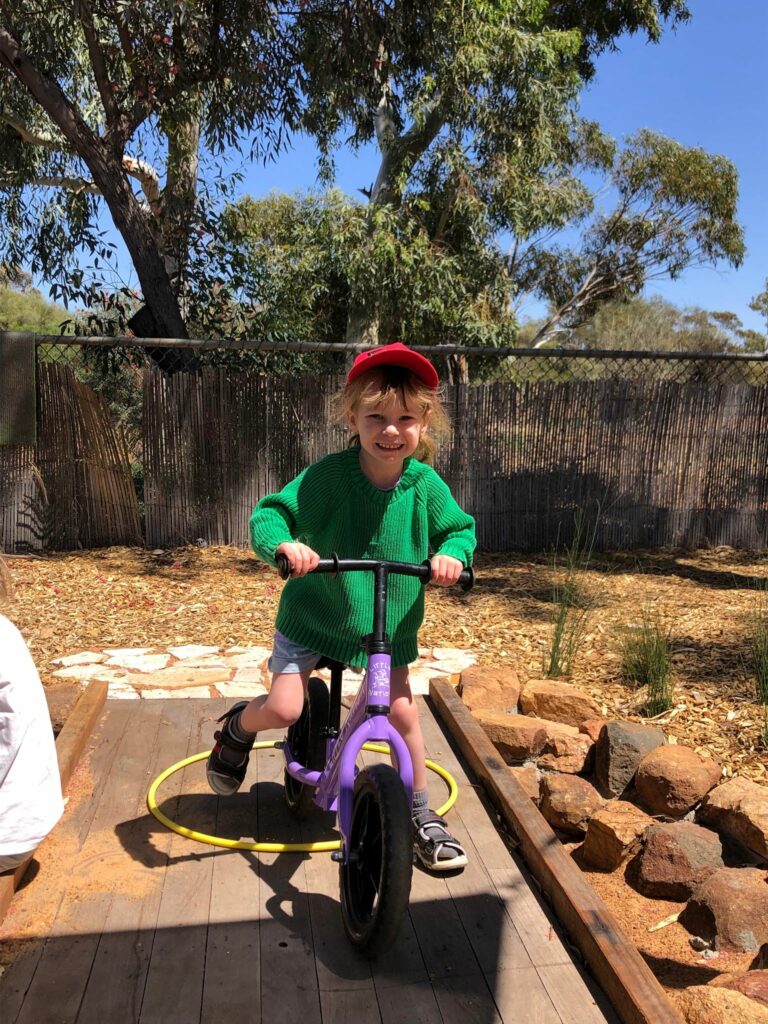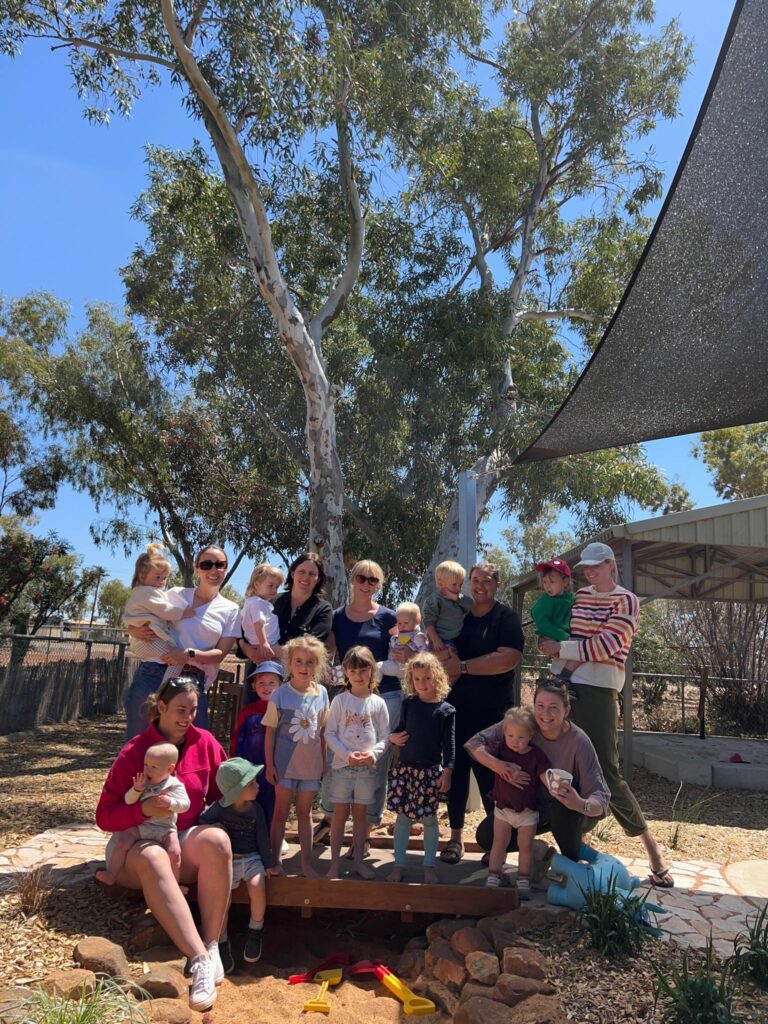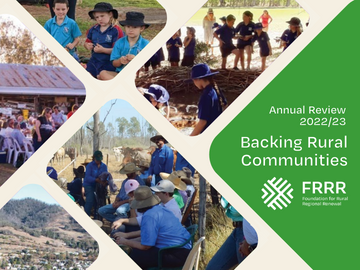Foundation for Rural & Regional Renewal (FRRR)
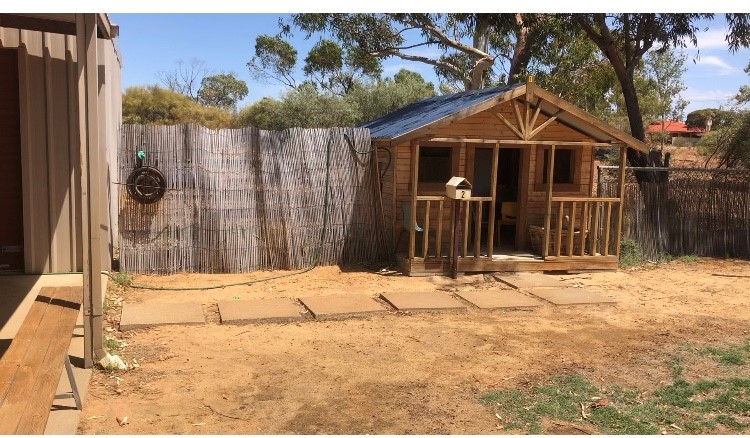 BEFORE
BEFORE
Morawa, a small town in Western Australia’s wheatbelt, lacks recreational and social opportunities for families with young children. With no cafes, the Morawa Playgroup, run for the last 40+ years, by mums (and the odd dad) serves as the primary gathering space for parents and caregivers seeking connection and support. However, Morawa Playgroup’s outdoor area was uninspiring, with a dying lawn and hard claypan soil.
Recognising the need for a vibrant outdoor space, the mums of Morawa Playgroup embarked on a project to transform their drab outdoor area into a nature playground. Collaborating with a local landscape designer, they developed a comprehensive plan to:
- Remove the old, inefficient irrigation system and replace it with a waterwise garden;
- Create a nature play space featuring sensory boxes, timber bridges, and a creek bed;
- Install shade sails to provide relief from the scorching sun and enhance the usability of the outdoor area;
- Establish seating areas for parents to connect and support each other while their children play.
The project unfolded over three years and received a boost from an FRRR grant of $9737, funded by Raine & Horne Foundation.
The completion of the project in September 2023 marked a significant milestone for Morawa Playgroup and the broader community. It’s now the only nature play space in the Shire, which spans 190km2, offering children and parents a welcoming and engaging environment. The shaded, waterwise garden has transformed the outdoor area, allowing children to play outdoors year-round and fostering a sense of connection among families.
Beyond the immediate benefits to the playgroup, the project’s impact extended to Morawa District High School, where reduced water bills freed up funds for educational resources. The positive effects of green spaces on mental wellbeing were evident at the opening of the new play space, signalling a brighter future for the community.
Despite the challenges of being a small, low socio-economic town, the project demonstrates the power of grassroots initiatives to improve quality of life. Morawa Playgroup’s success serves as a testament to the community’s resilience and determination to create a better future for its children and families.
Unmet need also increases
FRRR distributed a record $22.5 million last financial year, shared across more than 550 remote, rural and regional communities across Australia, according to the Foundation’s just-released 2022/23 Annual Review.
Remote and rural communities experience inequity, disadvantage and vulnerability across many basic aspects of day-to-day life. Yet they continue to rise to the challenge, innovate and deliver solutions that not only address issues but prove that better outcomes are possible with just a bit of support.
Last financial year, FRRR’s 1,158 grants enabled 972 grassroots organisations and groups to pursue local projects that responded to the now all-too familiar effects of natural disasters; accelerated the net-zero transition; and addressed long-standing structural issues such as housing, energy and food security, service provision and digital inclusion.
Natalie Egleton, CEO of FRRR, said the Foundation saw the largest number of applications in its 23-year history.
“In the face of these challenges, communities continue to pull together, harnessing the strengths of local people and their connection and commitment to their places to forge ahead. I’m proud of the role that FRRR has played in supporting these remote, rural and regional communities to strengthen, adapt and innovate to navigate and find solutions to these challenges.
“Last financial year, FRRR received 2,639 eligible grant applications requesting a total of $64 million, up more than 25% on the prior year. What this signals is that life is getting back to ‘normal’ following COVID, but it also highlights the ongoing challenges remote, rural and regional communities are facing when it comes to securing funding for local projects.
“Unsurprisingly, more than a third of our grants went to communities vulnerable to, or impacted by, climate-related disasters. Nearly 430 grants totalling $11.1 million were awarded for initiatives supporting the medium to long-term recovery of places affected by disasters, and projects helping to prepare communities for future climate-related impacts.
“In 2023 we received more than 1,310 donations, ranging from $1 to $7.9 million, totalling just over $25.4 million (excluding fees and deferred income). We are grateful for the continued commitment of our supporters and the trust they place in us to get funding to where it’s needed most and to strengthen capacity to adjust and rise to the challenges in these communities.
“Despite an increase in donations, FRRR could still only fund just over half of the eligible applications received. So, we continue to seek new partnerships with government, philanthropy, business and individuals to allow us to fund more of these projects.
“No matter how big or small, we know our grants make a difference to these communities. This year, for every dollar granted, a further $1.76 was leveraged, opening the door to further funding opportunities, and building confidence.
“We also continued to advocate for more well-informed investment in rural people and organisations. Looking ahead, we’ll keep having these conversations, sharing our insights to ensure these people and places get improved access to sustainable social and physical infrastructure and opportunities that build community connections.
“The tenacity of remote, rural and regional people to keep their communities vibrant and sustainable motivates us to continue to strive for our shared vision for a more vibrant, resilient and sustainable remote, rural and regional Australia,” Ms Egleton concluded.
FRRR’s FY23 Annual Review is available at www.frrr.org.au/AR23.
Originally a resting place for passing drovers, Foster is a small town just north of the Gippsland coast. Like much of regional Victoria, Foster was hit hard by COVID, with long-lasting economic, health and social outcomes. Impacts on social connection, the need to provide food relief for the community, and the reduced ability for community groups to fundraise were all felt strongly by the volunteers at Manna Community Garden.
Established 22 years ago, Manna Community Garden strives to improve food security and social wellbeing in the community. Working closely with Manna Gum Community House, community lunches are held and meals are provided for people in need of support. Demand for these lunches and meals was heightened during the pandemic and continues today, with the need exacerbated by escalating cost-of-living pressures. The two organisations also work together to provide assistance and information via workshops on topics such as grafting and seed saving, and a community stall at the local farmers’ market.
The fire pit in the gardens is an important gathering place for community members. The facility hosts the local youth group, community lunches, evenings in the garden events and NAIDOC week activities.
Before the pandemic, fundraising efforts were underway to pay for desperately needed upgrades to the Manna Community Garden, including to the garden beds and the amenities around the fire pit. A large Christmas in July fundraiser had to be cancelled two days before it was due to be held due to lockdown orders and while local sponsorship allowed the garden upgrades to go ahead, the works around the fire pit remained unfunded. The seating was dangerous and needed replacing if the gardens were to continue to provide an important social space for the community.
The volunteers at Manna Community Garden applied for an FRRR grant to supplement their fundraising strategy and allow them to continue with these much-needed works. Through an Australian Government-funded SRC Rebuilding Regional Communities grant for $2,600, the fire pit seating was able to be upgraded. The community of Foster is now able to safely enjoy the gardens as a space to socialise, come together, learn and provide food relief for the town.
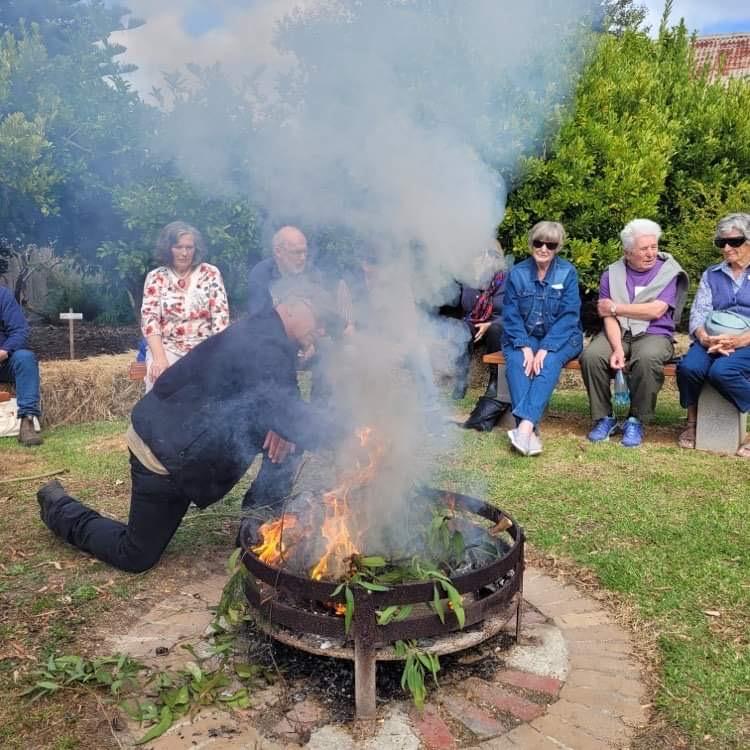

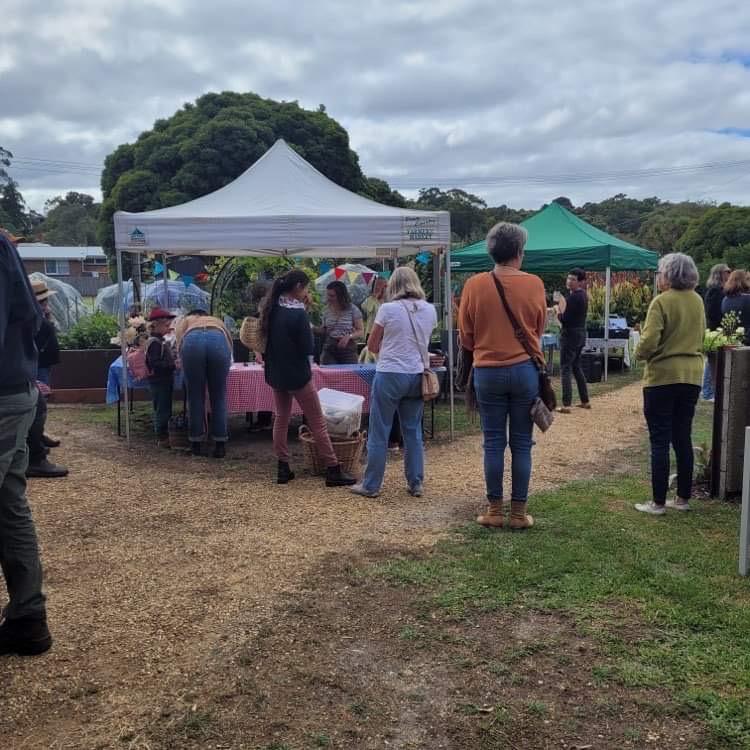
President of Manna Community Garden, Ms Juneen Schulz, explained the importance of the garden upgrades for reconnection:
“The space has provided a beautiful location for members of our community, especially our garden group, to connect. This is particularly important in the recovery from COVID-19, as it gives us a safe space to be together and rebuild our community.”
With the easing of COVID restrictions, Manna Community Garden has since joined together with other community gardens in the district to run annual events, bringing the wider South Gippsland and Bass Coast communities together and celebrating the benefits of growing locally. The first event, held in Foster in the newly renovated garden, attracted 60 guests and included workshops, guest speakers, and of course lots of beautiful locally grown produce!
“We wanted an inclusive day where community gardens across our slice of the universe could come together and discuss our favourite topics – growing food, looking after our hamlets and communities, sharing our knowledge.”
The neighbouring town of Meeniyan will host the next event, in what is hoped will be a long-running tradition – supporting communities that were badly impacted by COVID-19 to come together and encourage the health, economic, environmental, and social benefits of growing produce locally.
The work of Manna Community Garden shows that a small project can have a big, and long lasting, impact!
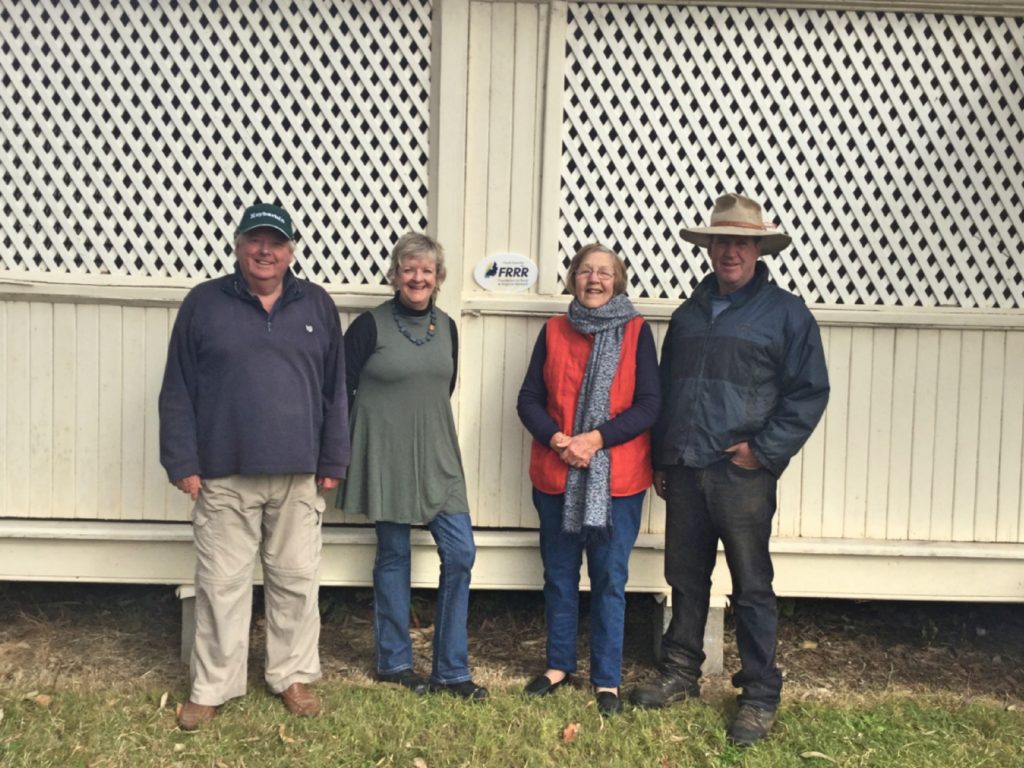
Nestled in the heart of the bush, halfway between Byron Bay and Coffs Harbour in NSW, lies the rural community of Baryulgil.
In the heart of Baryulgil is the Community Hall, located in the town square. The hall has stood for almost 90 years, and been used for social gatherings and fundraisers throughout the years.
With a population of fewer than 100 people, the community hall provides a much-needed place for local residents to gather. In recent years, the hall had fallen into disrepair, with dry rot in the walls, a leaking ceiling and broken windows.
The team at Baryulgil Charity Sports Club applied to FRRR’s Small Grants program, and received a $5,000 grant funded by The Yulgilbar Foundation, to complete maintenance works to ensure the local community could enjoy the hall for many years to come.
This grant enabled the Club to replace the damaged walls, remove dangerous stairways and doors, replace rusted gutters, and purchase heritage-colour paint to restore windows and doors that had been damaged by water.
Along with the popular social events and fundraisers, the hall can now be used by emergency services during bushfires, acting as a local hub for the NSW Rural Fire Service. The bulk of the project was completed in late 2019, with additional work delayed by COVID-19 to be completed in the near future.

